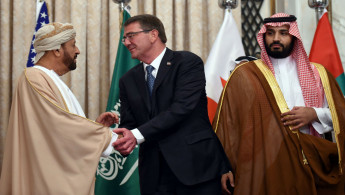Do more in Iraq, Pentagon chief tells Gulf
US Defence Secretary Ashton Carter called Wednesday for greater Gulf financial and political involvement in Iraq, which is battling both the Islamic State group and an economic crisis.
Carter made the comments after meeting in Riyadh with his counterparts from the six-nation Gulf Cooperation Council.
"I encourage our GCC partners to do more, not only militarily as the Saudis, as the UAE have been doing - and I really appreciate that - but also politically and economically," Carter told reporters after the talks.
He said Sunni support for "multisectarian governance and reconstruction" will be critical to ensuring the defeat of IS, the Sunni extremist group that has seized large parts of Shia-majority Iraq, and neighbouring Syria.
Shia-led paramilitary forces dominated by Iran-backed militias have helped push back the jihadists.
Iraqi Kurds, mostly Sunnis who have an autonomous region in the country's north, have received training to fight IS from a US-led coalition whose warplanes are bombing the jihadists in Iraq and Syria.
Saudi Arabia and other Gulf nations are part of that coalition but Carter called on them to exert diplomatic support as well, by re-opening embassies in Baghdad.
Saudi Arabia's ambassador to Iraq presented his credentials in January, re-establishing relations a quarter-century after they were cut following ex-president Saddam Hussein's invasion of Kuwait.
 |
Iraq is confronting a serious economic crisis caused by low global oil prices and years of mismanagement and corruption. |  |
The United States would like the oil-rich Gulf monarchies - although they themselves are facing falling revenues from collapsed crude prices - to help in Iraq's reconstruction.
This could be through contributions to the United Nations or even non-profit organisations, he said.
The question of support for Iraq is expected to be on the agenda Thursday when Carter joins President Barack Obama at a GCC summit in Riyadh.
Iraqi Prime Minister Haider al-Abadi on Wednesday called a number of Arab leaders including the Emirs of Qatar and Kuwait, the crown prince of the UAE and King Salman of Saudi Arabia to discuss mutual cooperation, according to a statement by his office.
Abadi's move comes as Iraq attempts to rebuild bridges with its Gulf neighbours after years of mistrust due to a belief held by GCC member states that Baghdad is under the influence of the chief rival, Iran.
Riyadh and its neighbours fear the US-supported Iranian nuclear deal will only embolden their rival, which they accuse of interference throughout the Middle East.
From the US perspective, greater Gulf involvement with Baghdad will counter Iranian influence.
"We say: 'Do more to help the politics work out'", a senior American defence official said.
However, before the Gulf states assist Baghdad they want guarantees over minority Sunni representation in parliament and their access to national financial resources, he said.
Iraq is confronting a serious economic crisis caused by low global oil prices and years of mismanagement and corruption.
Both the US and the United Nations have warned that the crisis could distract from efforts to combat IS.





 Follow the Middle East's top stories in English at The New Arab on Google News
Follow the Middle East's top stories in English at The New Arab on Google News
![Israeli forces ordered bombed Gaza's Jabalia, ordering residents to leave [Getty]](/sites/default/files/styles/image_330x185/public/2176418030.jpeg?h=a5f2f23a&itok=_YGZaP1z)

